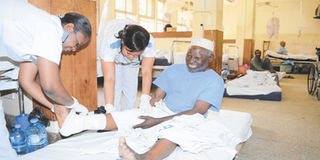Uninsured patients feel pinch of MNH machine breakdown

Muhimbili Orthopedic Institute (MOI) nurses attending to a patient who had been injured in an accident
What you need to know:
Most patients—and their relatives as well—are now forced to pay exorbitant fees for diagnosis at private facilities as the national hospital struggles to fix its own apparatus—the CT-Scan and MRI—which have been out of order for the last two months.
Dar es Salaam. Patients who don’t have access to medical insurance are feeling the pinch of lack of important diagnostic services at Muhimbili National Hospital (MNH) and Muhimbili Orthopaedic Institute (MOI).
Most patients—and their relatives as well—are now forced to pay exorbitant fees for diagnosis at private facilities as the national hospital struggles to fix its own apparatus—the CT-Scan and MRI—which have been out of order for the last two months.
One family from Lushoto in Tanga Region has already spent about Sh2 million in costs to treat their relative, Mr Yahya Gunda, 65, who sustained serious head injuries in a bus accident a month ago.
Mr Gunda cannot talk and has lost his memory. His brain has been affected by injuries he sustained in the accident. However, doctors cannot determine what exactly is wrong with him until he undergoes tests using the Magnetic Imaging Resonance (MRI).
Currently, the MRI at the national hospital is not operational and Mr Gunda’s family has been asked to access the diagnostic tests at a private hospital.
This means that the family will be forced to pay higher for the MRI. At MNH, it would have cost not more than Sh450,000 for a single test. But the cost is even higher at private diagnostic centres, according to MNH Senior Public Relations Officer Aminiel Algaesha.
One of Mr Gunda’s sons, Rahim Yahya, 34, told The Citizen that their father’s limbs were paralysed. Even if the family would try and raise the money for diagnosis, the cost of transporting their patient to the private health facility and other treatment services, poses another challenge, he said.
“Doctors have already told us that our father may also have to undergo brain surgery and all that requires money,’’ said Mr Rahim in an interview at MNH’s Sewahaji Ward.
“We are now thinking of seeking an exemption certificate from local authorities because we have exhausted our financial resources and may not afford to take care of our dad,’’ he said.
Only about 9 million people in Tanzania, which is about 20 per cent of the population, have access to medical insurance, according to a Budget Report issued by the Ministry of Health and Social Welfare in the financial year 2015/2016.
The rest are forced to pay out of their pockets to access healthcare services. This reporter witnessed accident victims who don’t have health insurance arriving at MNH.
Mr Mashauri Nassoro, 30, and a motorcyclist at Kongowe in Dar es Salaam was rushed to the hospital after his motorcycle collided with a speeding vehicle, leaving him with a serious injury on his head. He is not covered by any health insurance fund in the country and neither is any of his family members.
Mr Nassoro needed an emergency CT scan of the head when he was taken to MNH but it could not be afforded to him in the required time. The Citizen spoke with the family on the fourth day but they were still raising the contributions for the emergency test.
“We were given a referral note to take our relative to a private diagnostic centre in Kinondoni but this is the fourth day. We are trying to raise the money,’’ said Mashauri’s brother, Juma Nassoro, a resident of Kisiju in Coast Region.
It costs about Sh250,000 to undergo a CT-scan test at a private health facility, said Mr Juma Nassoro as he dislayed a document offered by MNH, with a list of diagnostics and treatment options offered for accessing services at private health facilities.
Without a CT-scan, it is difficult to determine the actual diagnosis in a patient with traumatic brain injury, says Dr Hamisi Kinyerero of the emergency unit at MOI.
“Despite its importance, we usually face a difficult time to explain to the relatives of the patients whenever we suggest a CT-scan,’’ says Dr Kinyerero. “Most people fail to afford it, even when our own machine is working at Muhimbili,’’ he adds.
Dr Kinyerero said that this time round, when the CT-scan at MNH is not operational, the number of brain surgeries performed at MOI for accident victims seem to have decreased too.
“It’s easy to make a decision whether or not to operate on someone with a head injury only when you have confirmed the diagnosis by a CT-scan. Without it, a doctor basically treats blindly,” says the medical officer.
Faulty spare parts for the CT scan and the MRI are being sought in Netherlands because they are not available in Tanzania, according to MNH officials.




